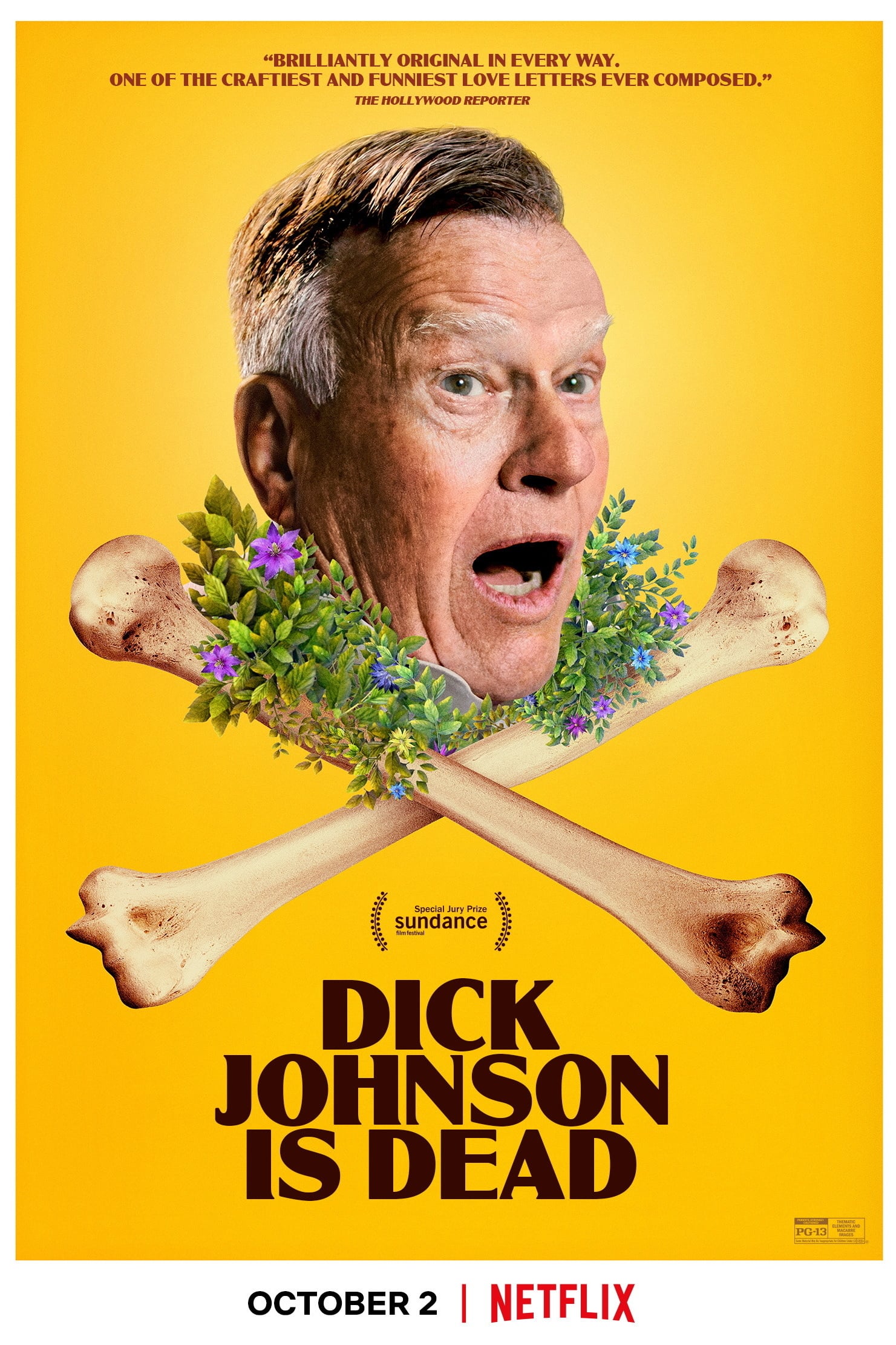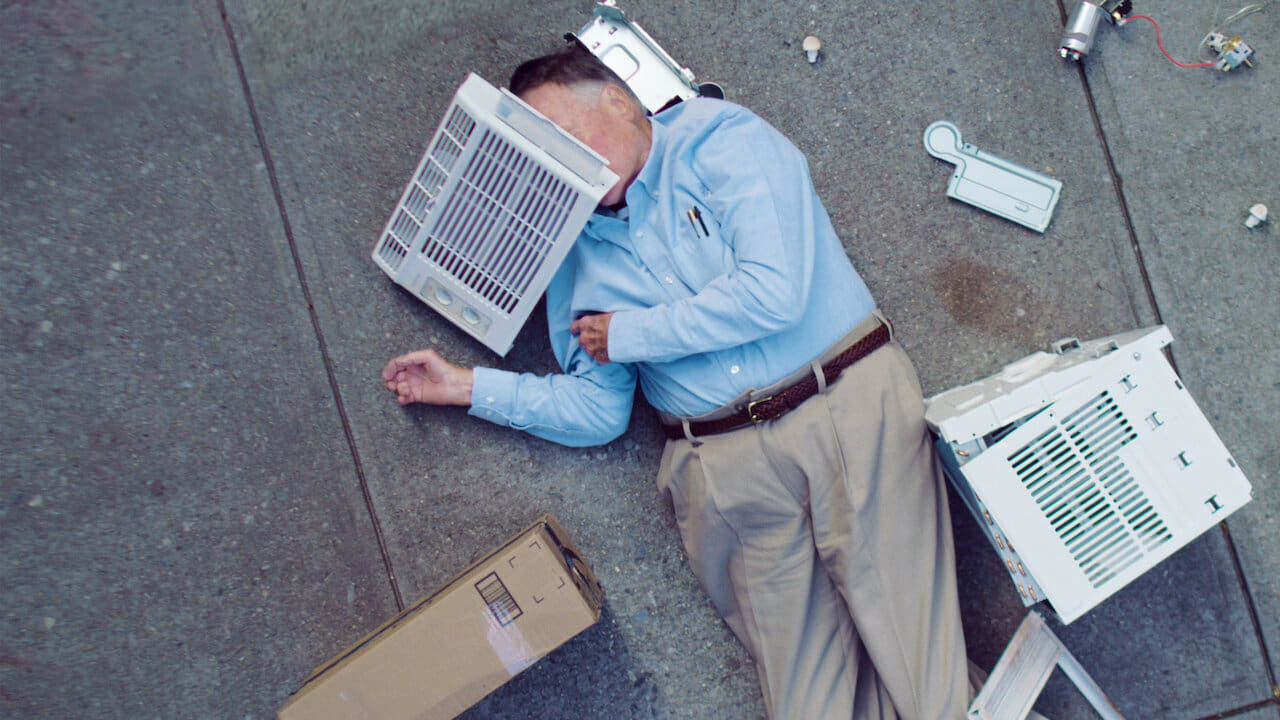
First I killed my father
Kirsten Johnson's 2016 feature-length documentary Cameraperson is one of the great non-fiction films of the last decade, a personal memoir that doubles as an inquiry into the "meaning" produced by the photographic moving image. For a while, it seems like her follow-up, Dick Johnson Is Dead, will end up splashing in similar thematic waters, as Johnson interrogates what it means to stage fictional versions of a non-fictional event, and whether in so doing, she grants a kind of "reality" to what she has staged. The film is a collaboration between the director and her father, Dick, who as the film opens (I think sometime in 2014; the film is a little foggy on the passage of time, not to its benefit) has a fairly recent diagonsis of dementia. It has progressed little enough that the two Johnsons agree to an odd psychological experiment for the both of them, combining his work as a psychiatrist with her work as a cameraperson: Kirsten will come up with different scenarios that lead to Dick's death, often very violent, and then film him starring in them as little cinematic vignettes. In so doing, the both of them will grow more comfortable with the idea of his impending demise, by having been able to directly confront what it looks like in film form.
Probably for the best, in order to avoid the thing getting unbearably repetitive, Dick Johnson Is Dead ends up having a lot more to it than that. The filming of the documentary ended up stretching to around four or five years (the shoot "ends" in 2018, when Dick was failing enough that Kirsten began to feel guilty about carrying on, though this isn't exactly the way she frames it; there is a little bit of material shot in 2019, during a late health scare that stirs up the same emotions Kirsten was dealing with through the bulk of production), and in the final cut, very little of it is actually devoted to killing Dick Johnson in various movie scenarios. Instead, it's mostly Kirsten's documentary of what making the documentary stirs up in her emotionally, charting her multi-year arc of finding that she can't come to grips with the knowledge that her father will soon die, that no matter how many different ways she tries to rehearse her feelings of loss, it's never "real" in the way she needs it to be, and the present fact of her father's deterioration moves and upsets her in ways she can't proactively cope with.
In a sense, then, Dick Johnson Is Dead ends up splitting into two threads, and the fact that it can't entirely reconcile them, nor find a good approach to trying to reconcile them, ends up being very much the point of the thing. On the one hand, there's the film the Johnsons set out to make: a dark comedy about Kirsten coming up with different ways of killing her dad, from the ridiculous to the quotidian, and the work they both put into making sure this is as cinematically satisfying as possible. As a snapshot of Kirsten Johnson's creative process and work ethic, Dick Johnson Is Dead is sometimes a lot of fun: an early highlight of the film is an interview with a stuntman who'll be playing Dick getting hit by a car, watching him move from confused to actively enthusiastic as he talks more with the father and daughter. Sometimes it's an engaging portrait of sausage making, as we see both the behind-the-scenes scenes of sequences and the final cut of the complete footage (sometimes in the opposite order), emphasising how the film we're watching is an attempt to construct a controlled reality around a situation that nobody controls. Sometimes, it's just fun to watch e.g. Kirsten's musical number about Dick in heaven, which goes from silly and tacky to genuinely moving as she puts masks of her parents (her mother died some years before this project started) on limber dancers, restoring youth and vigor to her dad in the face of his decrepitude.
And on the other hand, there's reality that Kirsten captures in scenes that basically amount to a series of video diaries, as her father reaches a point that he can no longer be left alone, and so moves in with her to be taken care of, and she reflects on how stupid and maybe even exploitative it is to keep up with this project, as her dad fades more and more, and keeps agreeing to the work just out of his love for her. If the first thread is openly theoretical, grappling with the question of whether putting something onscreen grants it a kind of realism, and if so, how that works (and this tension regarding the "truth" of film footage is left unresolved as late as the terrific joke in the film's very last shot), the second thread implicitly dismisses all of the first thread as somewhat besides the point.
But it's also still invested in the power of the camera to capture moments; the difference is that here, Kirsten can only react, filming the moments between her and her father as they actually happen, unplanned, simply to preserve these little slices of life as memories. Here, she's just the child of a dying parent driven by some sense that these last months and years need to be recorded and preserved; she's acting not with the instincts of a documentarian, but of a grieving family member. The conflict between the filmmaker and the daughter is the fuel of Dick Johnson Is Dead, in the end, resolved by Kirsten turning the project into a study of her own feelings as they evolve and darken over the course of five years. The project that emerges at the end of this is not the one it appears that she planned to make at the start, but that's the nature of filmmaking, and by finding a way to corral all of the difficult emotions of five years into a moving, insightful sketch of a family relationship, and at times tremendously funny dark comedy, Dick Johnson Is Dead remains a striking piece of cinema, and one that I'm terrifically glad that the Johnsons were brave enough to share with the rest of us.
Probably for the best, in order to avoid the thing getting unbearably repetitive, Dick Johnson Is Dead ends up having a lot more to it than that. The filming of the documentary ended up stretching to around four or five years (the shoot "ends" in 2018, when Dick was failing enough that Kirsten began to feel guilty about carrying on, though this isn't exactly the way she frames it; there is a little bit of material shot in 2019, during a late health scare that stirs up the same emotions Kirsten was dealing with through the bulk of production), and in the final cut, very little of it is actually devoted to killing Dick Johnson in various movie scenarios. Instead, it's mostly Kirsten's documentary of what making the documentary stirs up in her emotionally, charting her multi-year arc of finding that she can't come to grips with the knowledge that her father will soon die, that no matter how many different ways she tries to rehearse her feelings of loss, it's never "real" in the way she needs it to be, and the present fact of her father's deterioration moves and upsets her in ways she can't proactively cope with.
In a sense, then, Dick Johnson Is Dead ends up splitting into two threads, and the fact that it can't entirely reconcile them, nor find a good approach to trying to reconcile them, ends up being very much the point of the thing. On the one hand, there's the film the Johnsons set out to make: a dark comedy about Kirsten coming up with different ways of killing her dad, from the ridiculous to the quotidian, and the work they both put into making sure this is as cinematically satisfying as possible. As a snapshot of Kirsten Johnson's creative process and work ethic, Dick Johnson Is Dead is sometimes a lot of fun: an early highlight of the film is an interview with a stuntman who'll be playing Dick getting hit by a car, watching him move from confused to actively enthusiastic as he talks more with the father and daughter. Sometimes it's an engaging portrait of sausage making, as we see both the behind-the-scenes scenes of sequences and the final cut of the complete footage (sometimes in the opposite order), emphasising how the film we're watching is an attempt to construct a controlled reality around a situation that nobody controls. Sometimes, it's just fun to watch e.g. Kirsten's musical number about Dick in heaven, which goes from silly and tacky to genuinely moving as she puts masks of her parents (her mother died some years before this project started) on limber dancers, restoring youth and vigor to her dad in the face of his decrepitude.
And on the other hand, there's reality that Kirsten captures in scenes that basically amount to a series of video diaries, as her father reaches a point that he can no longer be left alone, and so moves in with her to be taken care of, and she reflects on how stupid and maybe even exploitative it is to keep up with this project, as her dad fades more and more, and keeps agreeing to the work just out of his love for her. If the first thread is openly theoretical, grappling with the question of whether putting something onscreen grants it a kind of realism, and if so, how that works (and this tension regarding the "truth" of film footage is left unresolved as late as the terrific joke in the film's very last shot), the second thread implicitly dismisses all of the first thread as somewhat besides the point.
But it's also still invested in the power of the camera to capture moments; the difference is that here, Kirsten can only react, filming the moments between her and her father as they actually happen, unplanned, simply to preserve these little slices of life as memories. Here, she's just the child of a dying parent driven by some sense that these last months and years need to be recorded and preserved; she's acting not with the instincts of a documentarian, but of a grieving family member. The conflict between the filmmaker and the daughter is the fuel of Dick Johnson Is Dead, in the end, resolved by Kirsten turning the project into a study of her own feelings as they evolve and darken over the course of five years. The project that emerges at the end of this is not the one it appears that she planned to make at the start, but that's the nature of filmmaking, and by finding a way to corral all of the difficult emotions of five years into a moving, insightful sketch of a family relationship, and at times tremendously funny dark comedy, Dick Johnson Is Dead remains a striking piece of cinema, and one that I'm terrifically glad that the Johnsons were brave enough to share with the rest of us.






